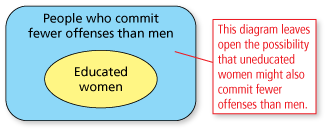-
Example 2 is a wonderful example of the use of logical analysis to help clearly understand arguments. When you casually read Daniel Defoe's statement, you might come up with the conclusion that he is saying that without education, women are guilty of more offenses than men. On more careful examination, however, you can see that is not implied. It is entirely possible that women are simply guilty of fewer offenses than men ... with or without education.
• Premise: If women had the same opportunity for education as men, then they would be guilty of fewer offenses than men. • Premise: Women have the same opportunity for education as men. • Conclusion: Women are guilty of fewer offenses than men. 
This example points out the need for careful logical analysis of arguments in all parts of life, but certainly in fields such as law, business, and contractual negotiations.
-
Prior to the Civil War, only five colleges admitted women, equating less than 1% of students. By 1960, approximately 30% of college students were women. Currently, many colleges and universities report higher ratios of female students than male students.
To view the world's top 200 universities, visit the Times Higher Education rankings. You can also view rankings based on reputation, subject, and location.
-
Here is a possible syllogism that involves this quote.
• Premise: All men are innocent in their own eyes. • Premise: John is a man. • Conclusion: John claims to be innocent. Here is another possible syllogism that involves this quote.
• Premise: Everyone arrested for a crime claims to be innocent. • Premise: John was arrested for a crime. • Conclusion: John claims to be innocent. Here is set diagram for the second syllogism.

-
These comments are not screened before publication. Constructive debate about the information on this page is welcome, but personal attacks are not. Please do not post comments that are commercial in nature or that violate copyright. Comments that we regard as obscene, defamatory, or intended to incite violence will be removed. If you find a comment offensive, you may flag it.
When posting a comment, you agree to our Terms of Use.






http://www.fordham.edu/halsall/mod/1719defoe-women.html